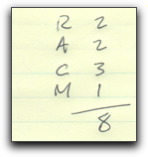-
Do I have to know much mathematics?
I will presume that you can follow an "algebraic
argument." I'll not require calculus, but will
talk a bit about it when we get to Newton. You'll
be fine, although if you've not had math in a
while, you might benefit from some at-home
redoing of any derivations I do in class. There
won't be many, but when they happen, they
illustrate important ideas.
-
What browser is best?
You'll need a modern >v4.x browser, Firefox,
Camino, Safari, Omniweb, or Mozilla...or, if you
have to, Internet Explorer. Cascading style
sheets (CSS) are used throughout as is
considerable Javascript.
-
What word processor do you recommend?
Some of your assignments will be written.
Generally, they should be turned in on
paper...just too many files. But, for the odd
circumstance, electronically as attachments in
Microsoft Word (or rtf) format is fine. Now, I
know that there are some colleges (I think Social
Science?) that actually use Word Perfect. So,
here's the deal. If not MS Word, you need to save
out your written work in Rich Text Format (rtf)
or make a pdf file (see next) out of it and send
that.
-
How do you grade writing?
After a lifetime of taking and given physics
problems as homework, I admit that I find grading
writing projects difficult. Here's how I do it,
unless otherwise warned:
I assign what I call a
RACM
score...suppose it is a 10 point assignment, then
it
might
look something like this:
|
R = "readability," |
2pts |
[This includes presence of introduction,
conclusion, how it flows]
|
|
A = "accuracy," |
3pts |
[This covers factual accuracy...could be the
physics, could be the philosophy or history.]
|
|
C = "completeness," |
4pts |
[This is roughly: how much effort did you put
into the project? Did you use sources from
the optional reading material? Outside
material? A minimum effort is...a shame.]
|
|
M = "mechanics," |
1 pt |
[Spelling, punctuation, citing references
properly, by now, you know the drill.]
|
At
the top of your paper, then, you'll maybe see:

suggesting
a pretty good effort.
-
What do you expect in terms of writing?
I would like for the essay writing that you do to
be of high quality. While I don't teach it, I
know it when I see it! So, please do the
following:
-
For hand-in papers, use a word processor,
preferably Microsoft Word...not Word 2007 or
2008. Use 1" margins and no smaller than 10pt
fonts.
-
Always write using complete
sentences.
-
Always write using proper grammar and
spelling.
-
Always proofread. Do what I do, ask someone you
trust to read what you wrote. Read them out
loud...that helps.
-
Format your papers so that
A) you have introductory and concluding
paragraphs
and
B) a paper body that presents the development
of your thesis in a logical manner.
I like lists and bullets if they make things
clear. However, don't use lists just a a way to
introduce white space!
-
There should be a bibliography with properly
cited resources that you used in the paper,
including electronic citations for web sites.
However, be sure that you don't end up relying
on some middle school kid's homework - be
discriminating in your web
research.
-
Take your writing seriously.
Short
papers will require discipline and, well, short
paragraphs. Therefore, your introductions and
conclusions, for example, will need to be
succinct.
Here are some sites that have grammar, citation,
and format help:
Citations, including electronic:
http://www.powa.org/document.htm#How to
Document
Good, all around advice:
http://garnet.acns.fsu.edu/~phensel/Teaching/powers1.html
A book on grammar:
http://andromeda.rutgers.edu/~jlynch/Writing/
Mistakes to avoid, from a copy editor:
http://www.theslot.com/carets.html
Silliness:
http://garnet.acns.fsu.edu/~phensel/Teaching/grammar.html


